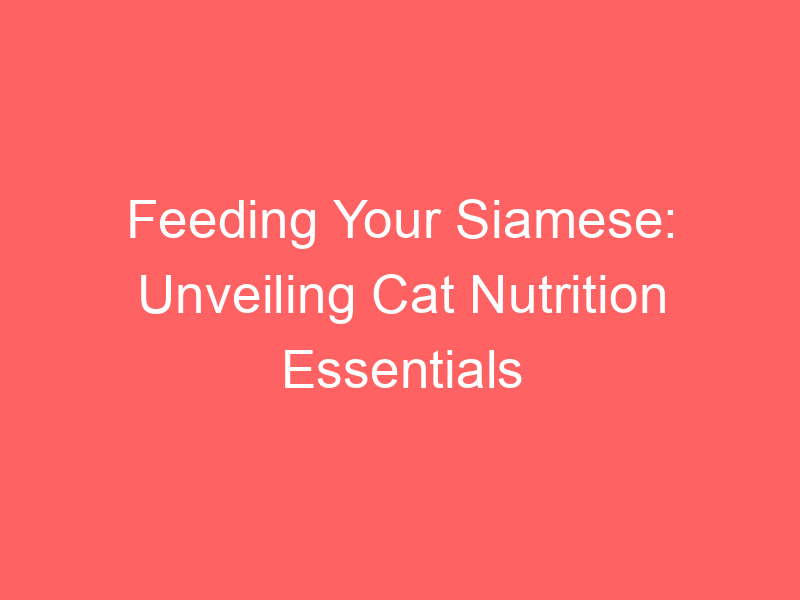Introduction to Siamese Cat Diet
Siamese cats are known for their striking blue eyes, short coat, and distinctive color points. However, what truly sets them apart is their unique dietary needs.
-
- Siamese Cat’s Unique Dietary Needs
This means they burn calories quicker and thus, require a diet high in protein to maintain their energy levels. They are also prone to certain health issues like obesity and dental diseases, which can be managed with a proper diet.
-
- Importance of a Balanced Diet for Siamese Cats
It should include a mix of proteins, carbohydrates, fats, vitamins, and minerals. Proteins are particularly important as they help in muscle development and repair. Carbohydrates provide energy, while fats are essential for skin and coat health. Vitamins and minerals support the immune system and help prevent diseases.
Feline Nutrition Basics
Understanding Cat Nutrition
Cats are obligate carnivores, meaning they require a diet rich in animal-based proteins. They also need certain fats, a minimal amount of carbohydrates, and a variety of vitamins and minerals.
-
- Proteins and their Importance
They provide essential amino acids, which are necessary for growth, tissue repair, and maintaining a healthy immune system. Cats, especially Siamese cats, require a high-protein diet.
-
- Role of Fats in a Cat’s Diet
They provide energy, help absorb vitamins, and contribute to a healthy skin and coat. Essential fatty acids like Omega-3 and Omega-6 cannot be produced by cats themselves and must be included in their diet. A healthy cat diet should contain about 20-30% fat.
-
- Carbohydrates: How Much is Too Much?
Cats do not require a lot of carbohydrates. In fact, too many carbs can lead to obesity and other health problems in cats. While there is no exact percentage, most experts agree that carbs should make up no more than 10% of a cat’s diet.
-
- Vitamins and Minerals: The Essential Micro-nutrients
They support various bodily functions, from bone health to vision. Cats need a variety of vitamins and minerals, including Vitamin A, Vitamin D, calcium, and taurine, an essential amino acid. These should be included in a balanced cat diet, too much can be harmful.
Special Nutritional Needs of Siamese Cats
-
- High Protein Requirements
This means they require a diet rich in protein to fuel their active lifestyles. High-quality animal protein, such as chicken or fish, should make up at least 40% of their diet. This helps to maintain their lean muscle mass and supports their overall health.
-
- Managing Weight and Lean Muscle Mass
Siamese cats have a naturally slim build, but they can still be prone to weight gain if their diet isn’t managed properly. A balanced diet, combined with regular exercise, can help maintain their lean muscle mass and prevent obesity. Foods with low-fat content and high fiber can aid in weight management, while still providing the necessary nutrients.
-
- Hydration Needs
Siamese cats need to stay hydrated for optimal health. However, they may not drink enough water on their own. To ensure they get enough fluids, consider incorporating wet food into their diet. This can provide additional hydration and can also be a good source of protein.
Siamese Cat Feeding Guide
Feeding Siamese Kittens
-
- Understanding the Growth Phase
They need a diet rich in protein, fat, and certain vitamins and minerals to support their development. Kittens should be fed a diet that contains at least 30% protein.
-
- Choosing the Right Kitten Food
When choosing the right food for your Siamese kitten, look for a high-quality, nutritionally complete kitten food. It should contain real meat as the first ingredient, and avoid foods with artificial colors, flavors, or preservatives.
-
- Feeding Frequency and Portion Sizes
Siamese kittens should be fed small, frequent meals throughout the day. As a general rule, kittens up to six months old should be fed four meals a day. From six months to maturity, they should be fed three meals a day. Always follow the feeding guide on the kitten food package for portion sizes, and adjust as necessary based on your kitten’s appetite and body condition.
Feeding Adult Siamese Cats
-
- Maintaining a Balanced Diet
Adult Siamese cats require a diet rich in proteins, fats, and carbohydrates. They also need essential vitamins and minerals, which are usually found in commercial cat foods. A diet high in protein supports their lean muscles, while fats provide energy. Carbohydrates, though less critical, still play a role in their overall health. Always ensure that the food you choose meets the nutritional standards set by the Association of American Feed Control Officials (AAFCO).
-
- Portion Control and Feeding Frequency
Overfeeding can lead to obesity, a common health issue in Siamese cats. To prevent this, control the portion size of your cat’s meals. A typical adult Siamese cat requires around 70 calories per kilogram of body weight per day. This can vary depending on their age, activity level, and health status. As for feeding frequency, most adult cats do well with two meals per day.
-
- Transitioning from Kitten to Adult Food
Start by mixing a small amount of adult food into their kitten food, gradually increasing the adult food and decreasing the kitten food over a week or two. By the end of two weeks, your cat should be eating only adult food. Adult cat food is formulated to meet the nutritional needs of adult cats, which are different from those of kittens.
Best Food for Siamese Cats
Commercial Cat Food Options
This food is a popular choice among cat owners due to its convenience and nutritional balance. There are two main types: wet food and dry food. Each has its own set of pros and cons.
-
- Wet Food vs. Dry Food
Wet food is typically more palatable and hydrating, making it a good choice for cats who don’t drink enough water. However, it’s more expensive and has a shorter shelf life than dry food. On the other hand, dry food is more affordable and can help keep your cat’s teeth clean, but it’s less hydrating and some cats may find it less appealing.
-
- Reviewing Top Brands
There are many commercial cat food brands on the market, but not all are created equal. Some of the top brands for Siamese cats include Royal Canin, Blue Buffalo, and Hill’s Science Diet. These brands offer formulas specifically designed for Siamese cats, with the right balance of proteins, fats, and carbohydrates to meet their unique nutritional needs.
Homemade Cat Food: Pros and Cons
When feeding your Siamese cat, you may be considering homemade cat food. This option has both benefits and challenges that you should be aware of before making a decision.
- Benefits of Homemade Food
- Quality Control: When you make your cat’s food at home, you have complete control over the ingredients. You can ensure that your cat is getting high-quality, fresh, and nutritious food.
- Customization: Homemade food allows you to tailor your cat’s diet to their specific needs. If your cat has allergies, dietary restrictions, or simply picky eating habits, homemade food can be a great solution.
- No Additives: Many commercial cat foods contain additives and preservatives that can be harmful to your cat’s health. With homemade food, you can avoid these unnecessary ingredients.
- Challenges and Risks of Homemade Food
- Nutritional Balance: Cats have specific nutritional needs that can be difficult to meet with homemade food. Consult with a vet or a pet nutritionist to ensure your homemade cat food is nutritionally balanced.
- Time and Effort: Making cat food at home can be time-consuming and requires a lot of effort. You’ll need to source ingredients, prepare the food, and store it properly.
- Cost: Depending on the ingredients you use, homemade cat food can be more expensive than commercial options.
Siamese Cat Health and Nutrition
This breed is known for its playful nature and striking appearance, but they also have specific dietary needs and common health issues that owners should be aware of.
Common Health Issues and Diet
-
- Obesity and Diet Control
Overfeeding or feeding them the wrong type of food can lead to weight gain. A diet high in protein and low in carbohydrates is ideal for this breed. Regular exercise is also crucial to keep them at a healthy weight.
-
- Dental Health and Diet
Dry food can help scrape off plaque and tartar from their teeth. Provide them with a balanced diet that includes wet food to ensure they get all the necessary nutrients.
-
- Kidney Health and Hydration
Ensure your cat stays hydrated. Wet food can provide extra hydration, but also make sure they have constant access to fresh water. Regular vet check-ups are also essential to monitor their kidney health.
Importance of Regular Vet Check-ups
-
- Monitoring Weight and General Health
Regular vet visits are essential for keeping track of your Siamese cat’s weight and overall health. Weight fluctuations can be a sign of underlying health issues. For instance, sudden weight gain might indicate obesity, while unexpected weight loss could be a symptom of diseases like diabetes or hyperthyroidism. Regular check-ups allow your vet to identify these issues early and take appropriate action.
-
- Addressing Dietary Concerns with Your Vet
Your vet can provide personalized dietary advice based on your cat’s age, weight, and health status. They can recommend specific types of food, suggest portion sizes, and even help you understand the nutritional needs of your Siamese cat. This can be particularly beneficial if your cat has specific dietary needs or health conditions that require a special diet.
Ensuring a Healthy and Happy Siamese Cat
-
Importance of a Balanced Diet
A balanced diet is crucial for your Siamese cat’s overall health and well-being. It should include a mix of proteins, fats, carbohydrates, vitamins, and minerals. Cats are obligate carnivores, meaning they require a diet primarily of meat. They also need certain nutrients found in vegetables and grains. A balanced diet will ensure your Siamese cat has the energy to play, the nutrients to grow, and the immune support to stay healthy.
-
Regular Vet Check-ups
These visits allow for early detection of potential health issues, ensuring that your cat gets the necessary treatment promptly. The American Veterinary Medical Association recommends at least one annual check-up for adult cats, but more frequent visits may be necessary for kittens or older cats.
-
Understanding Your Siamese Cat’s Unique Needs
This breed is known for its intelligence, playfulness, and need for companionship. They thrive on interaction and mental stimulation, so make sure to provide plenty of toys and playtime. Siamese cats can be more prone to certain health issues, such as dental disease and heart problems, so be aware of these potential concerns and discuss them with your vet.








